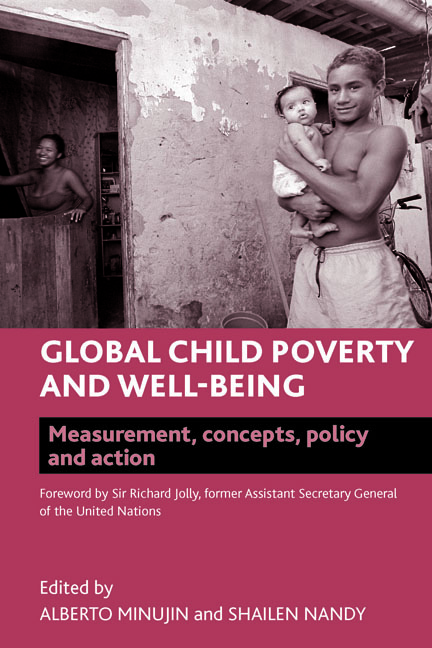fourteen - Multidimensional child deprivation in Iran
Published online by Cambridge University Press: 07 September 2022
Summary
Introduction
In recent decades there has been worldwide acknowledgement that children's well-being should be analysed in a multidimensional way (Gordon et al, 2003a,b; Minujin et al, 2005; Redmond, 2008; Roelen, 2010). Subsequently, various methodologies have evolved over time concerning the definition and measurement of various aspects of deprivation (Nussbaum, 1992; Sen, 1993; Robeyns, 2006; Alkire and Foster 2008). Therefore, a wide range of literature has been produced on the status of deprived children in various developing and developed countries (Wagstaff and Watanabe, 1999; UNICEF Innocenti Research Centre, 2000; Land et al, 2001; Gordon et al, 2003a,b; Notten and Roelen, 2010). Meanwhile, poverty scholars are increasingly highlighting the importance of contextualising deprivation analyses within the sociopolitical realities that surround communities (Wagstaff and Watanabe, 1999; Gassmann, 2000; Rogers, 2003; Belloni and Carriero, 2008; Jones, 2009; Wells, 2009; Bourdillion et al, 2010). Similarly, the context in which children's deprivations are studied is important. Despite commonalities among this age cohort, there are socioeconomic and political particularities in different societies that affect children's lives and their transition to adulthood. These particularities shape children's being and social identity in multicultural societies (Matthews and Limb, 1999; Qvortrup, 1999; de Moura, 2001; Monteith and McLaughlin, 2005).
As a multi-ethnic and multicultural society, Iran is not unusual in exposing children of various regions to diverse socioeconomic political and cultural realities (Atabaki, 2005; Hosseinbor, 2009; Khorshidi et al, 2010). However, for decades, scholars have predominantly focused on political disparities while studies on minorities’ socioeconomic conditions are scarce. Similarly, there are few disaggregated data on children's well-being from different ethnic groups in Iran. This chapter aims to analyse children's multidimensional deprivation and to examine differences between regions in Iran in 2009. The analysis aims to explore who are the most deprived children and how inequalities in children's deprivation can be distinguished on regional grounds. The data used in this study are drawn from the latest national income and expenditure survey conducted by the Statistical Centre of Iran in 2009).
Contextual analysis
In the past three decades, Iran has gone through many changes in sociopolitical, cultural and economic conditions. It is important to investigate some of these changes in order to contextualise the findings of this chapter.
- Type
- Chapter
- Information
- Global Child Poverty and Well-BeingMeasurement, Concepts, Policy and Action, pp. 325 - 356Publisher: Bristol University PressPrint publication year: 2012



